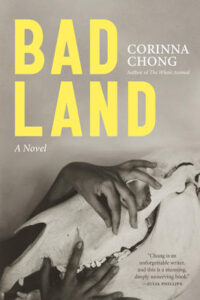‘Not quite living, but not quite dying’
Bad Land
by Corinna Chong
Vancouver: Arsenal Pulp Press, 2024
$24.95 / 9781551529592
Reviewed by Bill Paul
*

After being estranged from his older sister for seven years, Ricky Bergmann and Jez, his scrappy six-year-old daughter, pay a surprise visit to his sister Regina. Employed at the Fossil Land Discovery Museum, Ricky’s sister lives in the family home once owned by Mutti, their mother. It’s a musty, run-down house located in Drumheller, Alberta, in a region called the badlands, known for its canyons, dinosaur fossils, and unusual rock formations called hoodoos. In her second novel, Bad Land, Kelowna’s Corinna Chong brings together different family members, not “quite living, but not quite dying,” who carry grievances from the past.
The book begins with Regina’s account of her often strained and harrowing relationship with her mother. The latter half of the book describes a car trip that Regina and Jez go on in search of Mutti’s whereabouts. As she did in her book of short stories, The Whole Animal, Chong presents characters who are mixed up and struggling to understand themselves and their loved ones. Her writing is loose and expressive, dramatic and poetic, and full of small observant details. She strings together sentences that generate an atmosphere of anticipation and dread. Bad Land’s a compelling story that at times reads like a bad dream. The tense relationship between Regina and Jez stands at the heart of the story.
Both Regina and Jez are misfits known for behaving badly and both are accustomed to being shunned by family and community. Jez lives in her own world. She has imaginative conversations with a cuddly narwhal toy, a toothed whale named Earl; and she’s preoccupied with the Arctic Archipelago, a body of frigid waters where narwhals are found. Yet, when she is around children and adults she lacks compassion. Instead she’s aggressive and controlling. When Regina learns of a tragic accident that involved Jez and a young boy named Adam, she gradually gains Jez’s trust and the two become friends. Regina sees Jez as a mystery and recognizes the girl’s potential. Both characters lean on each other and develop a close auntie-niece relationship.
As the novel’s narrator, Regina describes herself as someone whose large physical size places her in “a different category of existence, as if large people had no significance at all in the world of regular size people.” When she was young her only companion was her pet bunny, Waldo, and so she became known by the kids in the neighbourhood as the “Big Bunny Lady.” Lacking any knowledge of social manners, she never learned how to relate to others. A sympathetic co-worker once set her up with a blind date but Regina sabotaged the occasion. At her brother Ricky’s wedding, his wife Carla and her family excluded her from a family tea ceremony and Regina reacts by smashing and breaking the family’s tea cup collection. Hurt and anger follow her around. She directs much of her anger at Mutti.

It’s Mutti’s life that ties all the characters together. Born in Germany, Mutti was a geologist who moved from Berlin to Drumheller after the Second World War when Regina was less than a year old. Unmarried, Mutti got involved in different relationships with men. Some of the men were abusive. In Regina’s childhood memories, Mutti is a dominant, unpredictable character. One memory involved Regina and her brother, Ricky, playing outside their mother’s workplace one day when a man approached them and offered them a sum of money to go “ride the dino” so he could seduce their mother. Another story, this one a much happier memory, has Regina accompanying her mother on a day trip to explore the canyon and sedimentary rocks near Drumheller. In the end, Mutti lives in a separate adult world that Regina does not fully understand.
Violence is a theme that recurs often in the novel. The wall in Regina’s bedroom, which used to be Mutti’s, has a crack in the plaster made by a baseball bat. At the side of a highway on their way to Edmonton, Regina and Jez encounter an elderly man on a bicycle who had “a pair of dark eyes [that] looked out from beneath” his baseball cap. On his shoulder he carries a duffel bag and inside the bag are clumps of human hair. Later, travelling to British Columbia by train, Regina and a woman passenger fall into a conversation about the missing and murdered women who disappeared on the Highway of Tears. In Prince Rupert, Regina and Jez are gazing at a demolished building site when Regina thinks she sees the shape of a woman’s body lying amongst the debris but realizes that it’s the “shiny melted carcass of a sheet of plastic.”
Bad Land is a tense psychological drama set during the end of summer when the heat was “suffocating the life out of the land.” The story is narrated in a detached but thoughtful tone by Auntie Reg fifteen years later when she has more or less come to terms with the familial experience. Her memory is sharp and thorough, piecing together her family’s history–the follies and misunderstandings of adults and children and strangers. People going through the motions but not understanding their own motivations. “Each memory is its own animal,” she declares. Regina doesn’t spare any details, not even her own cruelty and heartlessness. Near the end of the book, Jez reappears, older, much more reflective and therefore able to gather up everything that has ever happened to her and dream about a life of her own.
*
East Vancouverite Bill Paul enjoys photography and reading fiction and nonfiction. [Editor’s note: Bill Paul has reviewed books by Gurjinder Basran, Caroline Adderson, William Deverell, Deryn Collier, Jann Everard, Jack Lowe-Carbell, Martin West, Dietrich Kalteis, Suzannah Showler, Curtis LeBlanc, Patrick deWitt, Barbara Fradkin, Dietrich Kalteis, Stan Rogal, Keath Fraser, and John Farrow, and contributed a photo-essay, Trevor Martin’s Vancouver, to BCR.]
*
The British Columbia Review
Interim Editors, 2023-25: Trevor Marc Hughes (non-fiction), Brett Josef Grubisic (fiction and poetry)
Publisher: Richard Mackie
Formerly The Ormsby Review, The British Columbia Review is an online book review and journal service for BC writers and readers. The Advisory Board now consists of Jean Barman, Wade Davis, Robin Fisher, Barry Gough, Hugh Johnston, Kathy Mezei, Patricia Roy, Maria Tippett, and Graeme Wynn. Provincial Government Patron (since September 2018): Creative BC. Honorary Patron: Yosef Wosk. Scholarly Patron: SFU Graduate Liberal Studies. The British Columbia Review was founded in 2016 by Richard Mackie and Alan Twigg.
“Only connect.” – E.M. Forster